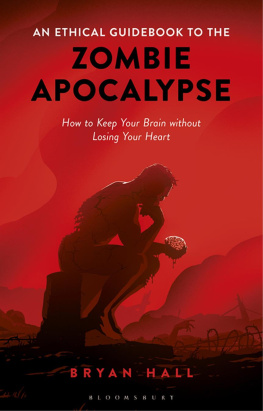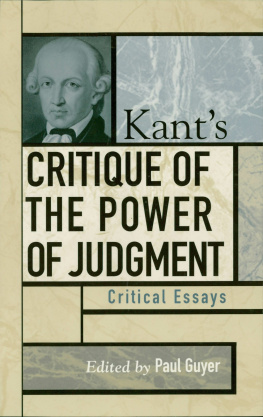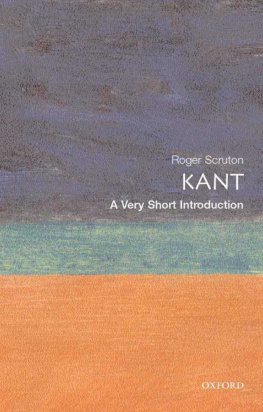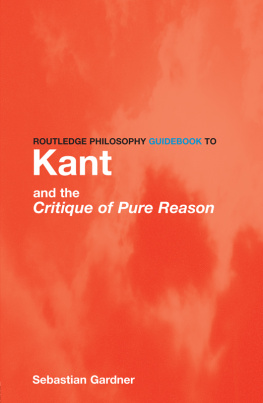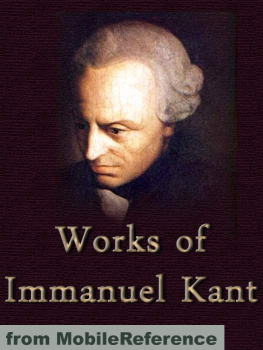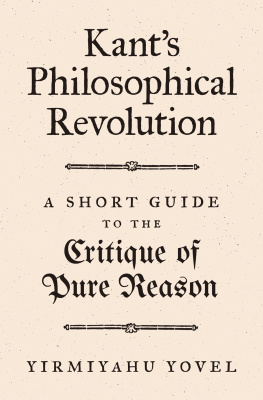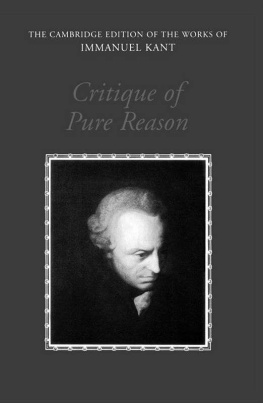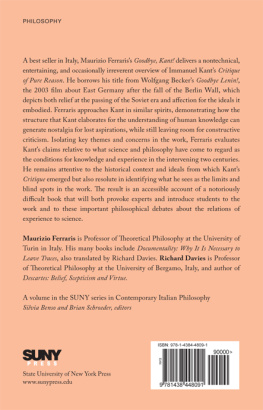Bryan Hall - The Arguments of Kant’s Critique of Pure Reason
Here you can read online Bryan Hall - The Arguments of Kant’s Critique of Pure Reason full text of the book (entire story) in english for free. Download pdf and epub, get meaning, cover and reviews about this ebook. year: 2011, publisher: Rowman & Littlefield, genre: Religion. Description of the work, (preface) as well as reviews are available. Best literature library LitArk.com created for fans of good reading and offers a wide selection of genres:
Romance novel
Science fiction
Adventure
Detective
Science
History
Home and family
Prose
Art
Politics
Computer
Non-fiction
Religion
Business
Children
Humor
Choose a favorite category and find really read worthwhile books. Enjoy immersion in the world of imagination, feel the emotions of the characters or learn something new for yourself, make an fascinating discovery.

- Book:The Arguments of Kant’s Critique of Pure Reason
- Author:
- Publisher:Rowman & Littlefield
- Genre:
- Year:2011
- Rating:5 / 5
- Favourites:Add to favourites
- Your mark:
- 100
- 1
- 2
- 3
- 4
- 5
The Arguments of Kant’s Critique of Pure Reason: summary, description and annotation
We offer to read an annotation, description, summary or preface (depends on what the author of the book "The Arguments of Kant’s Critique of Pure Reason" wrote himself). If you haven't found the necessary information about the book — write in the comments, we will try to find it.
Bryan Hall: author's other books
Who wrote The Arguments of Kant’s Critique of Pure Reason? Find out the surname, the name of the author of the book and a list of all author's works by series.
The Arguments of Kant’s Critique of Pure Reason — read online for free the complete book (whole text) full work
Below is the text of the book, divided by pages. System saving the place of the last page read, allows you to conveniently read the book "The Arguments of Kant’s Critique of Pure Reason" online for free, without having to search again every time where you left off. Put a bookmark, and you can go to the page where you finished reading at any time.
Font size:
Interval:
Bookmark:
The Arguments of Kants Critique of Pure Reason
Critique of Pure Reason
Bryan Hall
with the assistance of Mark Black and Matt Sheffield

Published by Lexington Books
A division of Rowman & Littlefield Publishers, Inc.
A wholly owned subsidiary of The Rowman & Littlefield Publishing Group, Inc.
4501 Forbes Boulevard, Suite 200, Lanham, Maryland 20706
http://www.lexingtonbooks.com
Estover Road, Plymouth PL6 7PY, United Kingdom
Copyright 2011 by Lexington Books
All rights reserved. No part of this book may be reproduced in any form or by any electronic or mechanical means, including information storage and retrieval systems, without written permission from the publisher, except by a reviewer who may quote passages in a review.
British Library Cataloguing in Publication Information Available
Library of Congress Cataloging-in-Publication Data
Hall, Bryan, 1977
The arguments of Kants Critique of pure reason / Bryan Hall with the assistance of Mark Black and Matt Sheffield.
p. cm.
Includes bibliographical references (p. ) and index.
ISBN 978-0-7391-4165-6 (cloth : alk. paper) ISBN 978-0-7391-4166-3 (pbk. : alk. paper)
1. Kant, Immanuel, 1724-1804. Kritik der reinen Vernunft. 2. Knowledge, Theory of. 3. Causation. 4. Reason. I. Black, Mark. II. Sheffield, Matt. III. Title.
B2779.H33 2011 | |
121dc22 | 2010047224 |
 The paper used in this publication meets the minimum requirements of American National Standard for Information SciencesPermanence of Paper for Printed Library Materials, ANSI/NISO Z39.48-1992.
The paper used in this publication meets the minimum requirements of American National Standard for Information SciencesPermanence of Paper for Printed Library Materials, ANSI/NISO Z39.48-1992.
Printed in the United States of America
This book is the product of several semesters of teaching Immanuel Kants Critique of Pure Reason (Abbreviated CPR) at both the undergraduate and graduate levels. Regardless of the level at which I have taught Kant, I found that my most difficult task was not getting the student to understand what Kants position is (admittedly difficult in its own right), but rather why Kant takes that position. Understanding the latter requires examining the arguments Kant offers for the positions that he adopts. Students generally have a terrible time reading Kant and to help them in this task I developed worksheets that defined Kants key terms and reconstructed the arguments that Kant was offering in CPR. We could then take time in class to examine how these arguments are reflected in the text as well as to criticize both Kant and the reconstructions in light of what we found in the text. In other words, the reconstructions were not an end in themselves, but rather a means toward engaging Kants text. The worksheets I developed for these classes were the inspiration for the current book and I encourage instructors to use this book in the same way as I used the worksheets in my own courses, viz., as a supplement to the text though not as a replacement for it. Given how valuable my students have been over the years in helping me hone these arguments, I asked two of my current students (Mark Black and Matt Sheffield) to aid in the writing of this book. At every stage of its development, these students insured that the book would be as accessible as possible to the students who one day would be reading it.
Again, the reconstructions of Kants arguments in this book should not be viewed as definitive, but are best regarded as starting points for engaging Kants arguments at a more formal level. His arguments are admittedly abstruse and there are often multiple ways in which an argument could be formalized such that each way is still consistent with the text. In addition, there may be more than one argument for a given conclusion. For example, in the First Analogy, I only reconstruct one of Kants arguments for the principle of the First Analogy though commentators have identified at least three different lines of argument for the principle. For each argument I reconstruct, however, I have chosen a way of formalizing it so that it is maximally consistent with the text and minimally valid (except for some of the arguments in the Transcendental Dialectic which are intended to be invalid). Instructors and students alike, however, should feel free to challenge the soundness of these arguments as well as to rework them in light of Kants text and the problems they see for the arguments as they are currently reconstructed.
Although certainly open to revision, the argument reconstructions can be useful when presenting Kants position in class and can aid in the evaluation of Kants arguments for validity and soundness. All that is really required for understanding the arguments is 1) a basic knowledge of propositional logic, and 2) an understanding of Kants technical vocabulary. When it comes to the first requirement, it could be useful to review the basic rules of inference before reading the book. When it comes to the second requirement, I have included a glossary near the end of this book which defines, in plain English, all of Kants technical terms. Since this book is written primarily for students, I thought it best to ask my students to help formulate definitions for Kants technical terms in hopes of insuring that these definitions are comprehensible for the average philosophy student.
In addition to helping write synopses for Kants arguments and translating his vocabulary into terms that the average philosophy student will understand, Matt and Mark have also written an appendix included at the end of the book. This appendix offers advice, from the perspective of a student, as to how one should approach CPR for the first time. In contrast to most pedagogical philosophical literature, this book is tailored to students by students.
The book is broken into three parts corresponding to the three parts of CPR that are typically covered in a course on Kant. The first part of the book deals with the Transcendental Aesthetic. The second part covers the Transcendental Analytic. The final part examines the Transcendental Dialectic. In total, the book reconstructs 36 of Kants arguments. Generally, a chapter begins with a quote from CPR followed by a synopsis of the argument. Often, the synopses offer examples, metaphors, and other illustrations to aid the reader in understanding Kants argument. Finally, each synopsis is followed by a reconstruction that presents formally what was explained informally in the synopsis. Each part of the book has both an introductory and a concluding chapter. Since the other chapters deal almost exclusively with individual arguments, it is important to read both the introductory chapter and the concluding chapter for each part of the book you are studying. The introductory chapters contain a general discussion of the arguments in individual chapters as well as how the arguments in different chapters are related to one another. The concluding chapters explain how these different arguments go to support Kants overall theory of transcendental idealism and how the arguments in that part of the book relate to arguments in different parts of the book.
Although the main focus is on reconstructing and explaining Kants central arguments, a proper understanding of these arguments often requires familiarity with their historical background as well as some of the central criticisms directed against them. The introduction covers much of the historical background that a student should be familiar with when approaching
Next pageFont size:
Interval:
Bookmark:
Similar books «The Arguments of Kant’s Critique of Pure Reason»
Look at similar books to The Arguments of Kant’s Critique of Pure Reason. We have selected literature similar in name and meaning in the hope of providing readers with more options to find new, interesting, not yet read works.
Discussion, reviews of the book The Arguments of Kant’s Critique of Pure Reason and just readers' own opinions. Leave your comments, write what you think about the work, its meaning or the main characters. Specify what exactly you liked and what you didn't like, and why you think so.

